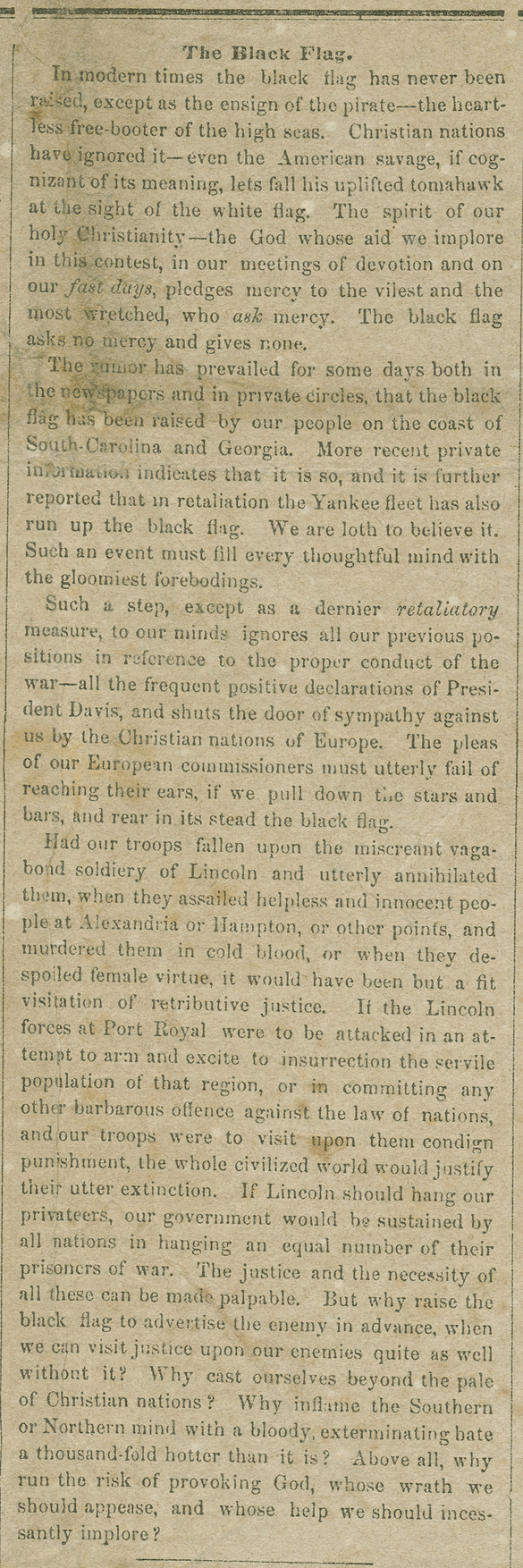Item description: newspaper article, “The Black Flag,” Weekly Standard (Raleigh), 20 November 1861, page 1, column 4.
Item transcription:
The Black Flag.
In modern times, the black flag has never been raised, except as the ensign of the pirate—the heartless free-booter of the high seas. Christian nations have ignored it—even the American savage, if cognizant of its meaning, lets fall his uplifted tomahawk at the sign of the white flag. The spirit of our holy Christianity—the God whose aid we implore in this contest, in our meetings of devotion and on our fast days, pledges mercy to the vilest and most wretched, who ask mercy. The black flag asks no mercy and gives none.
The rumor has prevailed for some days both in the newspapers and in private circles, that the black flag has been raised by our people on the coast of South Carolina and Georgia. More recent private information indicates that it is so, and it is further reported that in retaliation the Yankee fleet has also run up the black flag. We are loth to believe it. Such an event must fill every thoughtful mind with the gloomiest forebodings.
Such a step, except as a dernier retaliatory measure, to our minds ignores all our previous positions in reference to the proper conduct of the war—all frequent positive declarations of President Davis, and shuts the door of sympathy against us by the Christian nations of Europe. The pleas of our European commissioners must utterly fail of reaching their ears, if we pull down the stars and bars, and rear in its stead the black flag.
Had our troops fallen upon the miscreant vagabond soldiery of Lincoln and utterly annihilated them, when they assailed helpless and innocent people at Alexandria or Hampton, or other points, and murdered them in cold blood, or when they despoiled female virtue, it would have been but a fit visitation of retributive justice. If the Lincoln forces at Port Royal were to be attacked in an attempt to arm and excite to insurrection the servile population of that region, or in committing any other barbarous offence against the law of nations, and our troops were to visit upon them condign punishment, the whole civilized world would justify their utter extinction. If Lincoln should hang our privateers, our government would be sustained by all nations in hanging an equal number of their prisoners of war. The justice and the necessity of all these can be made palpable. But why raise the black flag to advertise the enemy in advance, when we can visit justice upon our enemies quite as well without it? Why cast ourselves beyond the pale of Christian nations? Why inflame Southern or Northern mind with a bloody, exterminating bate a thousand-fold hotter than it is? Above all, why run the risk of provoking God, whose wrath we should appease, and whose help we should incessantly implore?
Item citation: “The Black Flag,” The Weekly Standard (Raleigh, N.C.), 20 November 1861, page 1, column 4. From VC071 C748 folder 10, North Carolina Collection, Wilson Library, University of North Carolina at Chapel Hill.


